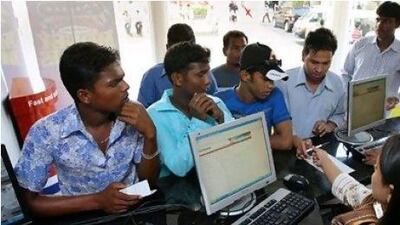India's overseas workers are thanking the Goddess Lakshmi for their good fortune.
The fall in the value of the Indian rupee against foreign currencies in the past few months has created a huge windfall for Indians working abroad.
As a result, a record-breaking number of non-resident Indians (NRIs) have been lining up to send money home by the bucketload, and many have even taken out bank loans locally to send the cash to their families in India.
"People are borrowing money to remit to India and it's easy to see why - overseas interest rates are lower than those in India," said Bhavin Shah, the marketing manager at TimesofMoney, an online remittance company.
Traditionally those NRIs remitting cash to invest in property and financial instruments have been the higher income earners. But the rupee's recent nosedive has made everyone a sophisticated investor.
"Our client base is mainly from the blue-collar workers' sector and we have noticed a shift in recent times that people are taking out loans to invest in stocks and shares and property, as well as sending money to their families," Mr Shah said.
Ibrahim Ahmed, the head of e-banking at Al Fardan Exchange, said the NRIs were watching the exchange rates closely.
"Whenever the transfer rate for Indian rupees changes to the favour of NRIs, they often tend to remit money in larger amounts," Mr Ahmed said. "When the currency is favourable to them, our remittances to India grow by at least 40 to 50 per cent at its peak in a month."
But Anil Rego, the chief executive of Right Horizons, an investment and wealth advisory company, sounded a note of caution and advised against investing with credit.
"Ideally, one should avoid investing on borrowed funds unless one is confident on the market bottom. I would wait before one actually does this. I would expect markets to continue to be volatile for some time," he said.
For those NRIs who have not yet jumped in to take advantage, there may still be time to cash in.
"The situation is unlikely to improve for some time to come. The global economy is in turmoil and any rebound in the short time is unlikely," said Arun Singh, an economist at Dun & Bradstreet.
The World Bank says this is going to be a record year in terms of remittances as Indians overseas have rushed to make the most of the rupee's fall. The bank said in its latest global migration and remittances brief that Indians working abroad would remit US$58 billion (Dh213.05bn) this year, the most for any country. China is second with $57bn. Remittances from India totalled about $53.1bn last year.
Indians working in Saudi Arabia, Oman, the UAE, Bahrain and Qatar contribute almost half of India's total remittances, the World Bank said in its report.
Deposits have flowed out of the UAE since April as the country's large Indian expatriate population took advantage of the rupee's fall against the dirham, said Jonathan Morris, the UAE chief executive at Standard Chartered.
"We saw a reversal in liquidity … but this is a one-off, driven by a depreciation in the Indian rupee," he said. "Large numbers of expats were sending money home."

